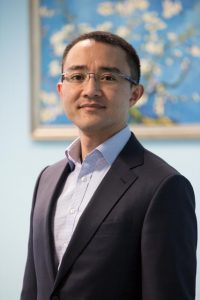
Dr Michael Wong is a spinal and neurosurgeon based in Melbourne.
In 2014 neurosurgeon Dr Michael Wong was almost killed by a mentally ill former patient in a frenzied stabbing attack in the foyer of his workplace, Melbourne’s Western Hospital.
The experience has left him with scars – inside and out – but he says it has also made him a better doctor.
Dr Wong was stabbed multiple times by Kareem Al-Salami, who was later diagnosed with paranoid schizophrenia, in an attack that made headlines around the country and raised questions about the safety of health professionals in the hospital system.
He sustained 14 stab wounds to the head, chest, abdomen, back, legs, arms and hands and was bleeding profusely as three by-standers dragged him to the hospital’s emergency ward where he was attended by 10 doctors.
He was rushed to theatre where life-saving surgery included the removal of part of a lung.
Three plastic surgeons repaired severed tendons and muscles in Dr Wong’s arms and hands, and for the following six weeks both his arms had to stay in splints.
Then followed intensive hand therapy with countless hours spent doing exercises to stretch and strengthen his hands.
One of his therapists believed his hands would never perform surgery again, Dr Wong tells the limbic.
“She has seen much less severe injury and the patient was not able to return to any meaningful work,” he says.
But Dr Wong did not share those fears. “I think very early on I realised I (would recover) full function of my hands, except it takes time. I didn’t lose a finger. All I had was lots of wounds, and wounds take time to heal, so [I believed ] if I do the exercises I would regain full function of my hands and would be able to return to work. But it was a bit of a long road.”

Three plastic surgeons mended severed tendons and muscles in Dr Wong’s arms and hands.
Along that long road the surgeon learned a valuable lesson about the gumption an individual needs to stay the course of a protracted rehabilitation program. He continued with the hand therapy for about a year.
And when he did return to work as a surgeon – at the Royal Melbourne Hospital – several months after the attack, he found a new reservoir of empathy for his patients.
“Having significant injury and surgery changed my view of how I deliver medicine,” he says. “You feel how the patient can feel.
“Often in the medical field we dismiss patients when they have a more minor problem. But after going through what I have been through you realise that’s not quite true. Patients with smaller problems can have a big impact and you have got to have that degree of compassion or empathy that you relay to the patient.”
Dr Wong’s attacker Kareem Al-Salami had been a spinal surgery patient. The former refugee from Iran had undiagnosed paranoid schizophrenia and blamed Dr Wong for ongoing pain in his arm, neck and back. He believed the doctor had botched the surgery and was covering it up.
When the case was heard before the Supreme Court of Victoria, a judge ultimately found Al-Salami not guilty of attempted murder on grounds of medical impairment and sentenced him to 25 years in a secure forensic mental health facility.